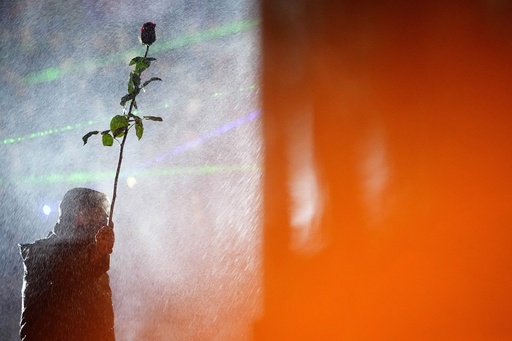TBILISI, Georgia — Mzia Amaghlobeli, a journalist currently imprisoned, is growing increasingly frail as her hunger strike has now lasted three weeks in Rustavi, a city close to Tbilisi, her legal representative stated.
At 49 years old, she is struggling to make the brief journey from her cell to their usual meeting area, prompting concerns for her health from human rights advocates, colleagues, and family members.
Amaghlobeli was taken into custody on January 12 during an anti-government demonstration in Batumi, a coastal city, among more than 40 individuals facing criminal charges from a wave of protests that have erupted in the South Caucasus nation of 3.7 million.
The political unrest follows a parliamentary election which the ruling Georgian Dream party won, though allegations of electoral fraud have been raised by the opposition.
This election result has drawn Georgia deeper into the sphere of influence of Russia, despite the country’s ambitions to join the European Union. Following the election, talks regarding EU membership were put on hold by the ruling party.
In an effort to solidify its hold on power, Georgian Dream has imposed strict measures on freedom of assembly and expression, with opposition members comparing the tactics to those used by President Vladimir Putin in Russia, Georgia’s historical overlord.
Prime Minister Irakli Kobakhidze has defended the government’s actions, accusing demonstrators of attempting to “harm the state” and instigating a revolution similar to the one in Ukraine that removed a pro-Kremlin regime in 2014.
Last year, the Georgian Dream party implemented a series of laws resembling those in Russia, which limit the activities of rights organizations and media and impose harsh restrictions on LGBTQ+ rights.
These laws, which were condemned by the European Union, also sparked widespread protests.
Amaghlobeli, the founder of two significant independent media outlets in Georgia, has been charged with assaulting a police officer, which carries a potential maximum sentence of seven years in prison.
Numerous detainees have reported experiencing verbal and physical abuse while in police custody. Human rights organizations on an international scale are raising alarms over the situation.
Alice Jill Edwards, the U.N. special rapporteur on torture, noted, “The circumstances depict an aggressive campaign designed to quell these demonstrations, the majority of which have been reported as peaceful.”
Allegations of abuse during detention paint a troubling picture for Amaghlobeli. A video released by the media shows her slapping Batumi’s police chief amidst the protests. Witnesses and her attorneys claim this action was a response to prior physical and verbal mistreatment by police.
While in custody, police allegedly continued to mistreat her, with her lawyer stating that the police chief “spat in Mzia’s face and denied her access to drinking water or using the toilet.”
Legal representatives maintain that authorities are looking into these allegations, although there has been no comment from the Interior Ministry.
Kobakhidze has pledged to investigate claims of excessive force, although he pointed out that Amaghlobeli’s actions took place “in front of cameras.”
He asserted that her crime was “absolutely evident.” Amaghlobeli, known for establishing the independent media sites Batumelebi and Netgazeti, initiated a hunger strike as a form of protest.
Now, rights advocates in Georgia and the West express their grave concerns regarding her safety. Michael O’Flaherty, the commissioner for human rights at the Council of Europe, emphasized the necessity of prompt action for her situation.
He remarked, “This is not only an issue of imprisonment and freedom – it’s a matter of life and death. I sincerely hope that authorities will respond quickly in this critical scenario.”
Amaghlobeli’s arrest has created a chilling atmosphere for journalists, according to Nestan Tsetskhladze, the editor of Netgazeti.
“If the founder of such a prominent independent media outlet, a director and manager free from political influence, is treated this way, it is evident that others will face the same fate or worse,” Tsetskhladze commented.
Among other notable figures arrested during recent protests is Andro Chichinadze, a popular actor who was apprehended after participating in demonstrations that flared up in November.
Chichinadze, 28, was arrested on December 5 with charges of “participating in group violence,” which could lead to a sentence of up to nine years.
His legal team claims prosecutors possess video evidence of him using a stick and throwing a bottle, allegedly thrown at him by police. However, they assert that there is no proof he harmed anyone, nor has anyone emerged as a victim.
Chichinadze maintains his innocence, and at a pre-trial hearing, he expressed feeling like a character from a Kafka novel, bewildered by the events unfolding around him.
His mother, Lika Guntsadze, referred to the allegations against her son as “absurd” during an interview.
The recent weekend also saw a surge in arrests, with police reporting that 31 individuals had been detained during ongoing protests in Tbilisi.
Many of those apprehended have since disclosed experiences of physical abuse at the hands of police during their apprehension and while being transported in police vehicles, according to Georgia’s Public Defender’s Office.
In a bid to further tighten control, the Georgian Dream party announced plans to implement more severe penalties for both criminal and administrative offenses related to protests, raising fines and prison terms.
Eka Gigauri, the executive director of Transparency International Georgia, expressed concerns that the approach taken by the government mirrors tactics used in Russia and Belarus.
She stated, “The methodology of targeting civic activists is not a new phenomenon; it has been occurring in Russia for many years.”
Guntsadze echoed this sentiment, lamenting over Georgia’s democratic aspirations, saying, “We chose Europe and found ourselves in Russia.”



